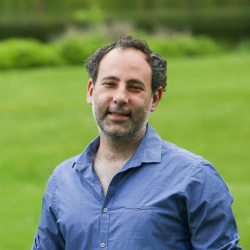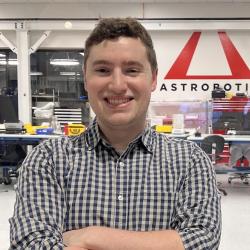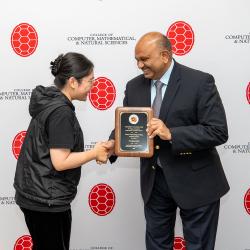Math Professor Chris Laskowski Named Distinguished Scholar-Teacher
Hailed as a ‘leading logician,’ Laskowski has been teaching at the University of Maryland since 1989.
Chris Laskowski, an expert in mathematical logic who has taught at the University of Maryland for 34 years, has been named a 2023 Distinguished Scholar-Teacher.

Established in 1978, the Distinguished Scholar-Teacher title is awarded to a select number of faculty members who have blazed trails in their classrooms and their areas of expertise. Honorees receive $5,000 to support their professional activities and are asked to give a public presentation on a topic relevant to their fields.
Doron Levy, chair of UMD’s Department of Mathematics, described Laskowski as one of the “leading logicians of his generation.”
“His groundbreaking research has always been intertwined with his passion for teaching, mentoring and education at all levels, from high school students to postdocs,” Levy said. “I am very happy to have a colleague that has done so much to promote the reputation of the University of Maryland and its Department of Mathematics.”
Laskowski earned his Ph.D. in mathematics from UC Berkeley in 1987. He went on to complete a two-year postdoctoral fellowship at the Massachusetts Institute of Technology and joined UMD in 1989, where he has been ever since.
He is widely known for his mathematical logic research—particularly a paper called “The uncountable spectra of countable theories” that appeared in the Annals of Mathematics in 2000. In that paper, Laskowski and his co-authors determined that every countable theory in mathematics can be sorted into 13 distinct “species” of spectra with shared properties.
“This was the capstone of years of work that mathematician Saharon Shelah started,” Laskowski said. “We can now say that among all theories, there are precisely 13 different strata.”
Laskowski also specializes in an area of research called Borel complexity, which assesses the complexity of first-order theories. In 2022, he received his largest grant from the National Science Foundation to conduct a three-year project aimed at computing the Borel complexity of every mutually algebraic theory, which has applications in computational learning.
This fall, he will teach a new graduate class of his own design—MATH818E: “Model Theory Via Unary Expansions”—based on his years of research.
“The course is going to be a compendium of more than 10 papers of mine over the last 15 years or so, including ones I’ve published and a couple still in preparation,” he said.
Laskowski has been enamored with this field of research ever since he took a mathematical logic course in graduate school, an experience that prompted him to drop his computer science major and pick up math instead.
In addition to his research and classes, he is a representative of the Association for Symbolic Logic as well as a 30-year member—and former chair—of the organizing committee for the Maryland High School Mathematics Competition. From 1999 to 2019, he also evaluated high school projects submitted to the Intel Science Talent Search competition.
He has mentored seven postdoctoral fellows, 16 Ph.D. students, and countless undergraduate and high school students throughout his career.
For Laskowski, it’s exciting to be named a Distinguished Scholar-Teacher and, more importantly, to have the chance to continue doing what he loves most. He enjoys the “theater” of teaching a packed room of students, especially his favorite large lecture course, MATH 241: “Calculus III,” an introduction to multivariable calculus.
“I find the students, most of whom are not math majors, to be very bright and interested in the subject,” Laskowski said. “I really love teaching and find it very invigorating—I’ve devoted a lot of my life to it.”







